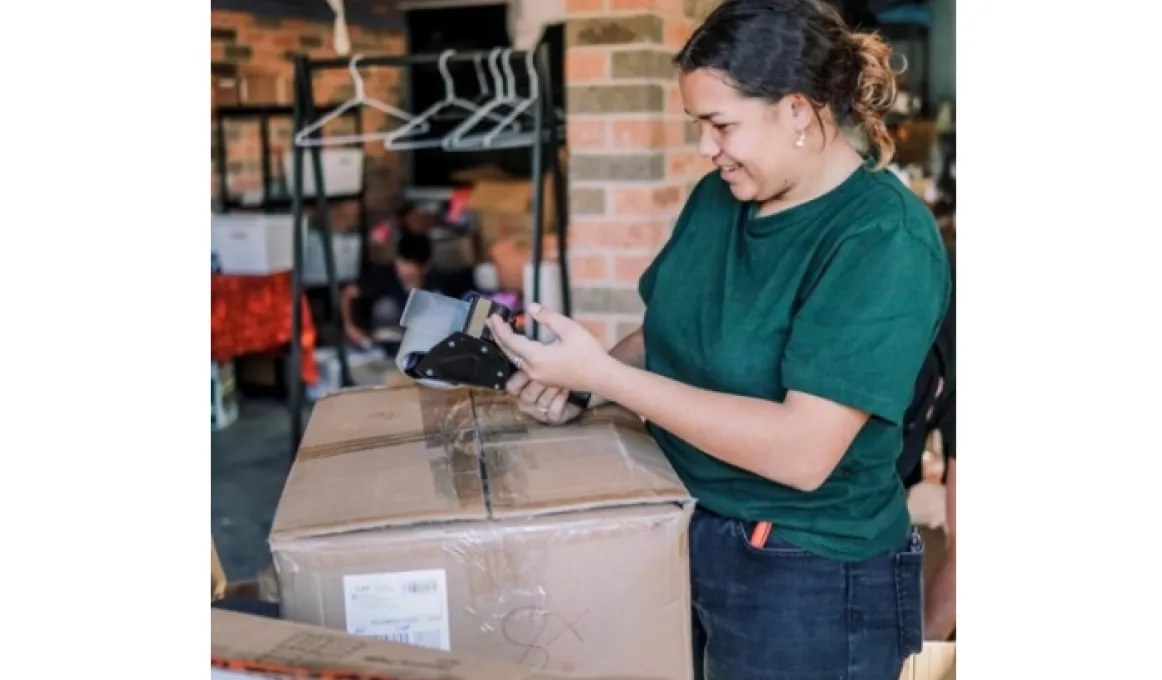How the Happy Boxes Project hired their first ever paid employee

The Happy Boxes Project has been so successful at sourcing and distributing women’s hygiene and wellbeing products to remote Aboriginal communities in Australia that it has now hired its first paid employee, Tquile.
In 2016 Emma Sullings was working at a school in the remote town of Elliot, Northern Territory. The school was having social issues with youth and community suicides, constant Sorry Business and low morale.
‘I was leading an Aboriginal school girls group when the girls decided they wanted to do something nice for their Mothers, Aunties and Elders to bring some smiles back to community,’ Emma said.
‘I put a call out on social media and “Happy Boxes” started flowing into the community so much so that each of the girls’ families received one and leftovers were distributed by the girls to other women in the community.’
From there, the project grew organically and today, the Happy Boxes Project is a small team of big hearted volunteers that source, ship and distribute much needed women’s hygiene and wellbeing products to the most remote Aboriginal communities in Australia.
With over 70 recipient communities and nearly 50 community coordinators, the project was in dire need of some administration assistance.
In the hopes of providing an employment opportunity to a young person, Emma approached Aboriginal Employment Strategy (AES) to discuss options.
“As an entirely volunteer run charity, the idea of the set up involved in establishing a paid workforce was daunting. AES made the process so smooth for us and took a huge weight off our shoulders,’ Emma said.
‘Utilising AES Group Training Organisation gave us access to knowledge around processes for recruitment and we were informed about our options.’
After identifying the needs of the organisation, AES found that a School-Based Trainee was the best fit for the role.
Selected for the position was Tquile.
‘At Happy Boxes I feel very privileged to have the role I’m in now,’ Tquile said.
‘I feel very comfortable with what I do because I love working with my community and helping others where I can. Happy Boxes has had a massive impact on my life by seeing the world from a different perspective, and some of the struggles other communities have to go through to get through a normal day.’
The Happy Boxes Project was involved every step of the way and are very happy with their new paid employee.
While AES take care of payroll, liability insurances, superannuation, contracts and regular mentoring and training check-ins, the Happy Boxes Project have the peace of mind knowing Tquile is well looked after while completing her Certificate II in Business Administration and HSC.
This frees them up to continue the important work they do to ensure women in our most remote regions of Australia don’t go without.
‘I hope Happy Boxes grows into something bigger than what it is now,’ Tquile said.
‘I would love to be more productive with the other communities, like going to visit them and seeing for myself the struggles they go through and helping them out.’
Find out more
Happy Boxes became a charity registered with the Australian Charities and Not-for-profits Commission (ACNC) on 30 October 2019. Since then it has become a Public Benevolent Institution with Deductible Gift Recipient status.
The National Indigenous Australians Agency supports the Aboriginal Employment Strategy through the Indigenous Advancement Strategy to deliver employment and mentoring services to Aboriginal and Torres Strait Islander peoples.
The Aboriginal Employment Strategy (AES) is a national Aboriginal recruitment and group training company that supports Indigenous people to prepare for and find successful careers.